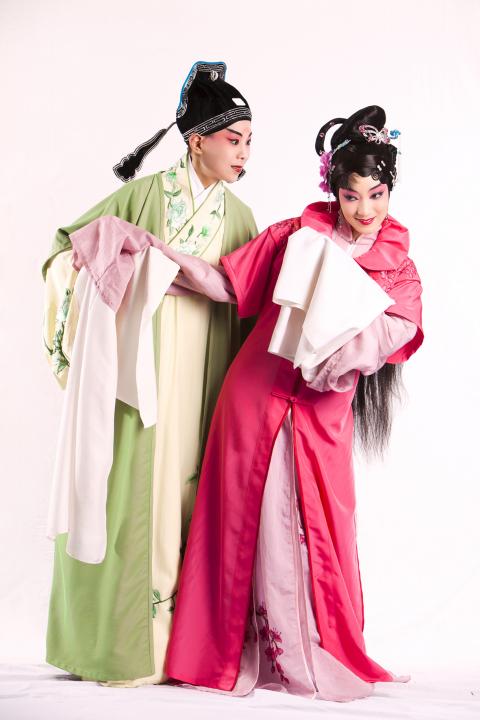The Legend of Peach Blossom Fan (亂紅), which was produced for the 2012 International Theatre Festival (2012國際劇場藝術節), is 1/2 Q Theatre’s (二分之一Q劇場) ninth original production, and once again, while the appearance of the show is at first glance traditional, a closer look reveals a deep postmodernist vein.
The group has focused for many years on creating modern experimental works that draw heavily on traditional Chinese opera, particularly kun opera (崑曲). The English title is taken directly from the name of the work that inspired this production, a performance written by the early Qing Dynasty playwright Kong Shangren (孔尚任). With more than 30 major characters and 40 acts, Peach Blossom Fan (桃花扇) focuses on a love story between the young scholar Hou Fangyu (侯方域) and courtesan Li Xiangjun (李香君), which takes place against the backdrop of the fall of the Ming Dynasty. The collapse of Ming power, which was eventually replaced by the Manchu Qing Dynasty of northern “barbarians,” was an event that touched many poets and scholars deeply, and the overwhelming sense of devastation is conveyed in a work that has been described as “China’s greatest historical drama.”
While Peach Blossom Fan has been adapted into various operatic styles, the current production brings together a variety of sub-genres into a single work. This approach is in line with the show’s postmodernist aspirations, but one cannot help but wonder what purpose is served by bringing together performers from kun, Taiwanese and Beijing opera, other than to broaden the work’s appeal. Certainly the cast list is appealing. It includes Yang Han-ju (楊汗如), a longtime collaborator of director Tai Chun-fang (戴君芳) and a major figure in kun opera, Taiwanese gezai opera singer Li Pei-ying (李佩穎), Beijing opera specialist Ling Chia-lin (凌嘉臨), and guest star Wu Shuang (吳雙), a leading member of the Shanghai Kun Opera Company (上海崑劇院).

Photo courtesy of NTCH
1/2 Q Theatre is constantly looking for new ways to interpret the classical repertoire from which it draws inspiration, and on this occasion the complex story is given an added dimension through a parallel story that’s set in the Qing Dynasty, which allows the director room to explore different outcomes based on the same narrative foundation. This “game theory” model seems particularly apt in dealing with the insurmountable dilemmas that faced the characters in Kong’s original play. By uprooting the moral issues from their historical time and place, 1/2 Q Theatre aims for universality and contemporary relevance, as the characters seek an equilibrium during a clash of civilizations. Purists are likely to be offended, and depending on the slant you put on the interpretation of postmodernism, the show is likely to appeal or offend in equal measure.

In the March 9 edition of the Taipei Times a piece by Ninon Godefroy ran with the headine “The quiet, gentle rhythm of Taiwan.” It started with the line “Taiwan is a small, humble place. There is no Eiffel Tower, no pyramids — no singular attraction that draws the world’s attention.” I laughed out loud at that. This was out of no disrespect for the author or the piece, which made some interesting analogies and good points about how both Din Tai Fung’s and Taiwan Semiconductor Manufacturing Co’s (TSMC, 台積電) meticulous attention to detail and quality are not quite up to

April 21 to April 27 Hsieh Er’s (謝娥) political fortunes were rising fast after she got out of jail and joined the Chinese Nationalist Party (KMT) in December 1945. Not only did she hold key positions in various committees, she was elected the only woman on the Taipei City Council and headed to Nanjing in 1946 as the sole Taiwanese female representative to the National Constituent Assembly. With the support of first lady Soong May-ling (宋美齡), she started the Taipei Women’s Association and Taiwan Provincial Women’s Association, where she

Chinese Nationalist Party (KMT) Chairman Eric Chu (朱立倫) hatched a bold plan to charge forward and seize the initiative when he held a protest in front of the Taipei City Prosecutors’ Office. Though risky, because illegal, its success would help tackle at least six problems facing both himself and the KMT. What he did not see coming was Taipei Mayor Chiang Wan-an (將萬安) tripping him up out of the gate. In spite of Chu being the most consequential and successful KMT chairman since the early 2010s — arguably saving the party from financial ruin and restoring its electoral viability —

It is one of the more remarkable facts of Taiwan history that it was never occupied or claimed by any of the numerous kingdoms of southern China — Han or otherwise — that lay just across the water from it. None of their brilliant ministers ever discovered that Taiwan was a “core interest” of the state whose annexation was “inevitable.” As Paul Kua notes in an excellent monograph laying out how the Portuguese gave Taiwan the name “Formosa,” the first Europeans to express an interest in occupying Taiwan were the Spanish. Tonio Andrade in his seminal work, How Taiwan Became Chinese,